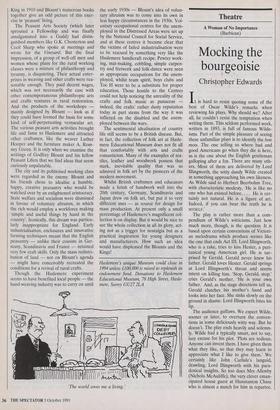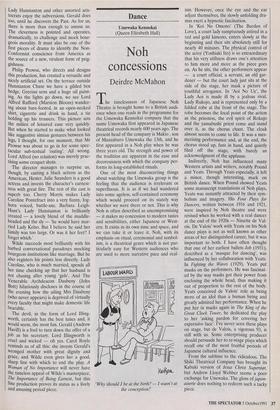Theatre
A Woman of No Importance (Barbican)
Mocking the bourgeoisie
Christopher Edwards
It is hard to resist quoting some of the best of Oscar Wilde's remarks when reviewing his plays. Why should we? After all, he couldn't resist the temptation when writing them. This seldom performed work, written in 1893, is full of famous Wilde- isms. Part of the simple pleasure of seeing these unfamiliar plays is to identify the bon mots. The one telling us where bad and good Americans go when they die is here, as is the one about the English gentleman galloping after a fox. There are many oth- ers. Most of them are delivered by Lord Illingworth, the witty dandy Wilde created in something approaching his own likeness. As Wilde said to Herbert Beerbohm Tree, with characteristic modesty, 'He is like no one who has existed before. . . . He is cer- tainly not natural. He is a figure of art. Indeed, if you can bear the truth he is MYSELF.'
The play is rather more than a com- pendium of Wilde's witticisms. Just how much more, though, is the question. It is based upon certain conventions of Victori- an melodrama which produce scenes like the one that ends Act III. Lord Illingworth, who is a rake, tries to kiss Hester, a puri- tanical young American girl. He is sur- prised by Gerald. Gerald never knew his father. Gerald loves Hester. Gerald springs at Lord Illingworth's throat and seems intent on killing him. 'Stop, Gerald, stop,' cries Gerald's mother. 'He is your own father.' And, as the stage directions tell us, Gerald clutches his mother's hand and looks into her face. She sinks slowly on the ground in shame. Lord Illingworth bites his lip.
The audience guffaws. We expect Wilde, sooner or later, to overturn the conven- tions in some deliciously witty way. But he doesn't. The play ends heavily and solemn- ly. Wilde had a typically smart, not to say, lazy excuse for his plot. 'Plots are tedious. Anyone can invent them. I have given them what they like, so that they may learn to appreciate what I like to give them.' We certainly like John Carlisle's languid, drawling, Lord Illingworth with his para- doxical insights. So too does Mrs Allonby (Nichola McAuliffe), the very clever eman- cipated house guest at Hunstanton Chase who is almost a match for him in repartee.
Lady Hunstanton and other assorted aris- tocrats enjoy the subversions. Gerald does too, until he discovers the Past. As for us, there is more than enough to amuse us. The cleverness is pointed and operates, dramatically, to challenge and mock bour- geois morality. It must also be one of the first pieces of drama to identify the Non- Conformist conscience from America as the source of a new, virulent form of prig- gishness.
Philip Prowse, who directs and designs this production, has created a versatile and nicely artificial set. On the terrace outside Hunstanton Chase we have a gilded box hedge, Grecian urns and a huge oil paint- ing. As the lights go down, we see Lord Alfred Rufford (Marston Bloom) wander- ing about bare-footed, in an open-necked shirt, cigarette and drink in hand, a tie holding up his trousers. This picture sets the milieu of leisured ease very quickly. But when he started to make what looked like suggestive simian gestures between his legs, I thought, for one moment, that Mr Prowse was about to go in for some spec- tacular sub-textual 'outing'. All wrong. Lord Alfred (no relation) was merely prac- tising some croquet shots.
The director manages to surprise us, though, by casting a black actress as the American, Hester. Julie Saunders is a good actress and invests the character's earnest- ness with great fire. The rest of the cast is superb too. Cherry Morris makes Lady Caroline Pontefract into a very funny, fog- horn voiced, battle-axe. Barbara Leigh- Hunt's Lady Hunstanton is brilliantly created — a lovely blend of the muddle- headed and the sly — 'he would have mar- ried Lady Kelso. But I believe he said her family was too large. Or was it her feet? I forget which.'
Wilde succeeds most brilliantly with his barbed conversational paradoxes mocking bourgeois institutions like marriage. But he also registers his points less directly. Lady Caroline, who is much married, spends all her time checking up that her husband is not chasing after young 'gels'. And The Venerable Archdeacon Daubeny (John Bott) hilariously discloses in the course of the evening how the ailing Mrs Daubeny (who never appears) is deprived of virtually every faculty that might make domestic life bearable.
The devil, in the form of Lord thing- worth, certainly has the best tunes and, it would seem, the most fun. Gerald (Andrew Havill) is a fool to turn down the offer of a job as his secretary. Lord Illingworth is cruel and wicked — oh yes. Carol Royle reminds us of all this: she invests Gerald's wronged mother with great dignity and grace, and Wilde even gives her a good, sharp line with which to end the play. A Woman of No Importance will never have the timeless appeal of Wilde's masterpiece, The Importance of Being Earnest, but this fine production proves its status as a lively and amusing period piece.



















































 Previous page
Previous page